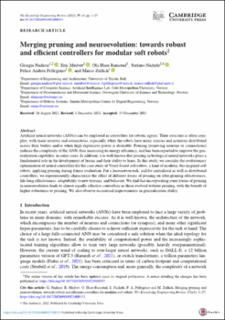| dc.contributor.author | Nadizar, Giorgia | |
| dc.contributor.author | Medvet, Eric | |
| dc.contributor.author | Huse Ramstad, Ola | |
| dc.contributor.author | Nichele, Stefano | |
| dc.contributor.author | Pellegrino, Felice Andrea | |
| dc.contributor.author | Zullich, Marco | |
| dc.date.accessioned | 2023-01-03T07:43:09Z | |
| dc.date.available | 2023-01-03T07:43:09Z | |
| dc.date.created | 2022-02-04T14:53:17Z | |
| dc.date.issued | 2022 | |
| dc.identifier.citation | Knowledge engineering review (Print). 2022, 37 (e3), 1-27. | en_US |
| dc.identifier.issn | 0269-8889 | |
| dc.identifier.uri | https://hdl.handle.net/11250/3040433 | |
| dc.description.abstract | Artificial neural networks (ANNs) can be employed as controllers for robotic agents. Their structure is often complex, with many neurons and connections, especially when the robots have many sensors and actuators distributed across their bodies and/or when high expressive power is desirable. Pruning (removing neurons or connections) reduces the complexity of the ANN, thus increasing its energy efficiency, and has been reported to improve the generalization capability, in some cases. In addition, it is well-known that pruning in biological neural networks plays a fundamental role in the development of brains and their ability to learn. In this study, we consider the evolutionary optimization of neural controllers for the case study of Voxel-based soft robots, a kind of modular, bio-inspired soft robots, applying pruning during fitness evaluation. For a locomotion task, and for centralized as well as distributed controllers, we experimentally characterize the effect of different forms of pruning on after-pruning effectiveness, life-long effectiveness, adaptability to new terrains, and behavior. We find that incorporating some forms of pruning in neuroevolution leads to almost equally effective controllers as those evolved without pruning, with the benefit of higher robustness to pruning. We also observe occasional improvements in generalization ability. | en_US |
| dc.language.iso | eng | en_US |
| dc.publisher | Cambridge University Press | en_US |
| dc.relation.uri | https://www.cambridge.org/core/journals/knowledge-engineering-review/article/abs/merging-pruning-and-neuroevolution-towards-robust-and-efficient-controllers-for-modular-soft-robots/AECEF6CDC3173BB8DDD | |
| dc.title | Merging pruning and neuroevolution: towards robust and efficient controllers for modular soft robots | en_US |
| dc.title.alternative | Merging pruning and neuroevolution: towards robust and efficient controllers for modular soft robots | en_US |
| dc.type | Peer reviewed | en_US |
| dc.type | Journal article | en_US |
| dc.description.version | publishedVersion | en_US |
| dc.source.pagenumber | 1-27 | en_US |
| dc.source.volume | 37 | en_US |
| dc.source.journal | Knowledge engineering review (Print) | en_US |
| dc.source.issue | e3 | en_US |
| dc.identifier.doi | 10.1017/S0269888921000151 | |
| dc.identifier.cristin | 1997941 | |
| cristin.ispublished | true | |
| cristin.fulltext | original | |
| cristin.qualitycode | 2 | |
